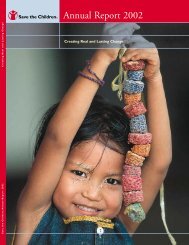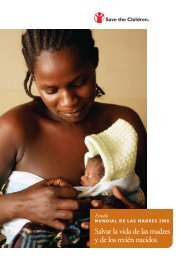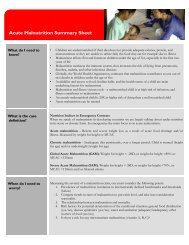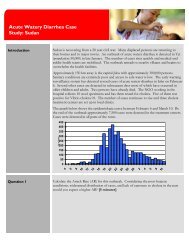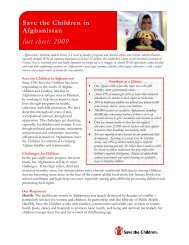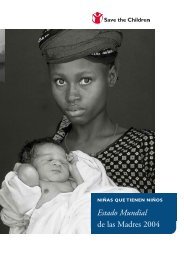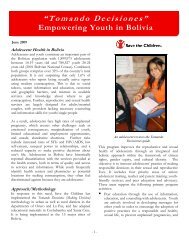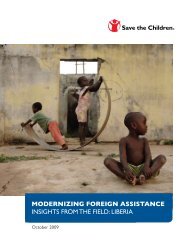Adolescent Sexual and Reproductive Health Toolkit for - UNFPA
Adolescent Sexual and Reproductive Health Toolkit for - UNFPA
Adolescent Sexual and Reproductive Health Toolkit for - UNFPA
Create successful ePaper yourself
Turn your PDF publications into a flip-book with our unique Google optimized e-Paper software.
Implementation of the<br />
MISP takes priority!<br />
Life-saving interventions are the priority<br />
during an acute emergency. For this reason,<br />
the MISP is always the first RH intervention<br />
to be introduced. The MISP should never be<br />
delayed while waiting to conduct an assessment<br />
or analyze results.<br />
Ethical <strong>and</strong> Legal Considerations<br />
when Conducting Assessments<br />
with <strong>Adolescent</strong>s<br />
<strong>Adolescent</strong>s have the right to the highest attainable<br />
st<strong>and</strong>ard of health, including sexual <strong>and</strong> reproductive<br />
health, during emergency situations. In both emergency<br />
<strong>and</strong> stable situations, it is often necessary to<br />
collect in<strong>for</strong>mation about the adolescent population,<br />
in order to underst<strong>and</strong> their SRH needs <strong>and</strong> design<br />
programs that specifically address those needs.<br />
<strong>Adolescent</strong>s should be permitted to contribute to the<br />
knowledge base that is used to guide the programs<br />
they benefit from. It is essential, however, that care<br />
is taken not to cause harm to the adolescent or put<br />
him/her at risk <strong>for</strong> the sake of collecting adolescent<br />
data. This is particularly important with regard to<br />
ASRH, which may be personally, culturally or<br />
politically sensitive.<br />
The WHO Scientific <strong>and</strong> Ethical Research Group<br />
(SERG) has established guidelines <strong>for</strong> the ethical<br />
collection of data from adolescents. These guidelines<br />
are summarized as follows:<br />
• Parents <strong>and</strong> guardians have the legal <strong>and</strong> ethical<br />
responsibility to protect very young <strong>and</strong> dependent<br />
adolescents <strong>and</strong> to provide them with preventive<br />
<strong>and</strong> therapeutic health care. If the results of the<br />
assessment will lead to improved preventive <strong>and</strong><br />
therapeutic care <strong>for</strong> the adolescent, then parents<br />
<strong>and</strong> guardians should not be opposed to their<br />
participation in the process.<br />
Generally, parents <strong>and</strong> guardians do not have the<br />
legal power to overrule the decisions of mature<br />
(competent) adolescents who wish to participate<br />
in an assessment. From a legal perspective, agencies<br />
or individuals conducting SRH assessments do<br />
not violate the law by involving adolescents who<br />
are sexually active (or who are about to become<br />
sexually active) in studies when the benefit to the<br />
adolescent outweighs the risk. If, however, the<br />
local law denies decision-making power to adolescents<br />
who are below a certain age (regardless of<br />
their competence or maturity), then this law<br />
must be respected.<br />
• Ethical considerations that must be taken into<br />
account when conducting assessments or research<br />
among adolescents.<br />
1. Agencies conducting research or assessments<br />
among adolescents must ensure that:<br />
• The goal of the assessment is to obtain<br />
in<strong>for</strong>mation that is relevant to adolescents’<br />
health needs;<br />
• The in<strong>for</strong>mation could not be scientifically<br />
gained from adult sources;<br />
• The risk of conducting the assessment is low<br />
in comparison with the benefit that will be<br />
obtained from the in<strong>for</strong>mation;<br />
• The interventions that are introduced as a<br />
result of the assessment will directly benefit<br />
adolescents <strong>and</strong> will be at least as advantageous<br />
as any available alternative.<br />
Special care must be taken when collecting<br />
data from very young adolescents. Very<br />
young adolescents should not be recruited<br />
<strong>for</strong> the assessment unless the in<strong>for</strong>mation<br />
gained from them cannot be obtained from<br />
older adolescents.<br />
2. Unless the law specifically states otherwise,<br />
consent to participate in the assessment should<br />
be obtained from the adolescent alone. If the<br />
adolescent is mature enough to underst<strong>and</strong> the<br />
purpose of the proposed assessment <strong>and</strong> the<br />
level of involvement requested of him/her, then<br />
s/he is mature enough to provide in<strong>for</strong>med<br />
consent to participate.<br />
3. Confidentiality must always be observed when<br />
conducting research with adolescents.<br />
Assessment Tools<br />
53



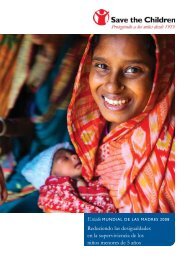
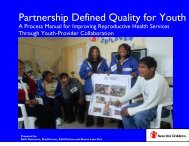
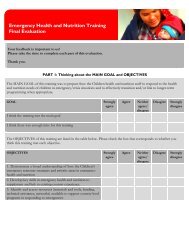
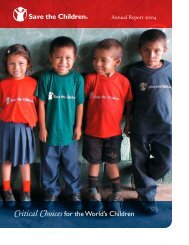
![View full document [PDF 3.39 MB] - PreventionWeb](https://img.yumpu.com/27308954/1/190x245/view-full-document-pdf-339-mb-preventionweb.jpg?quality=85)
